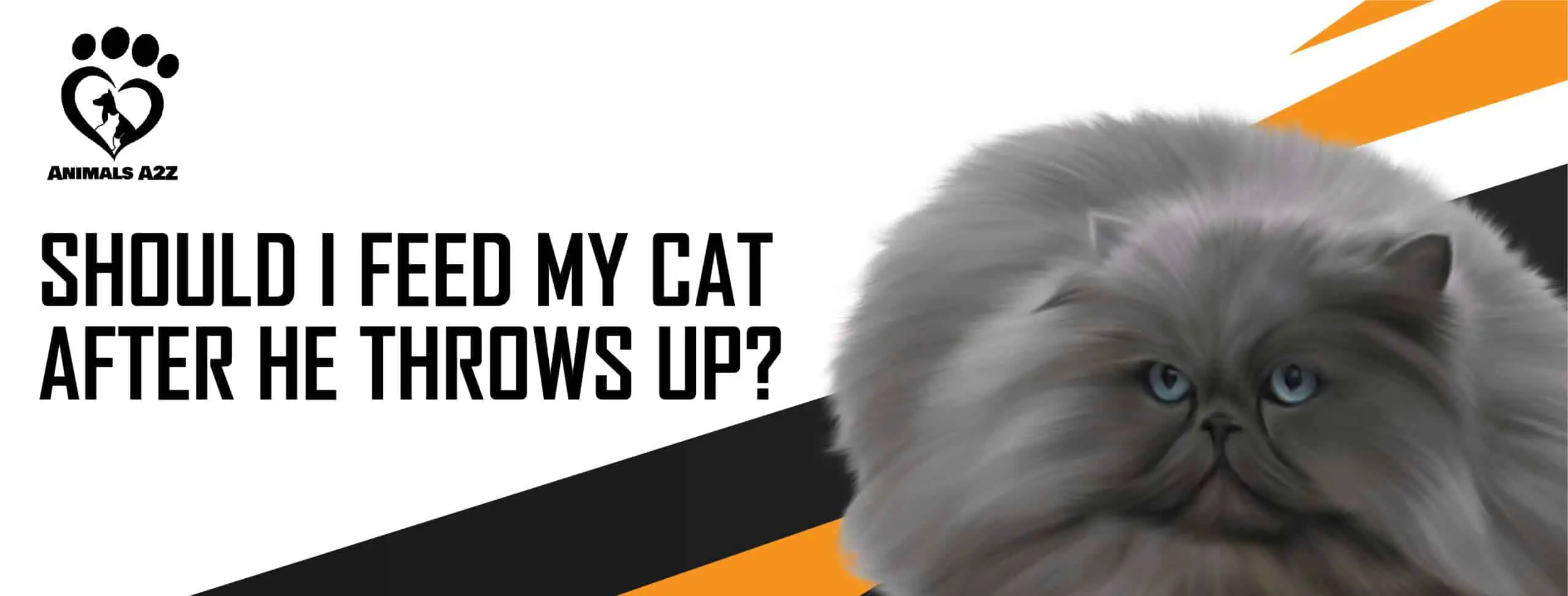As a pet owner, it’s always concerning when you see your beloved furry companion vomit or even show symptoms of pain and gagging. There are plenty of reasons for this and the next best course of action would be to avoid feeding them while waiting for a couple of hours to give time for the irritation to subside.
Table of Contents
When should I feed my cat after he throws up?
If your cat has just thrown up, it is a good idea to remove their food for a couple of hours. You should not feed the cat right after throwing up. After a couple of hours feed them small amounts of digestible food like chicken. Wait 24 hours before going back to the usual routine.
What to feed your cat if it is sick: Best food for a sick cat
What is the reason my cat vomits?
Cats vomit due to something upsetting their stomach. As an owner, you need to be able to tell the difference when it’s serious or if it’s just the usual hairball. Here are some of the most common reasons to why your cat vomiting, along with their symptoms, and what you can do to prevent them from happening:
Eating too fast
A cat’s stomach is small, when they eat too fast their stomach wall expands rapidly. When this happens, the animal receives a regurgitating signal from the brain. Undigested food and fluid will then travel from the esophagus to the mouth. Symptoms of this include undigested food, fermented smell, and gagging. To prevent this from happening again you can purchase a slow feeding bowl or dish out their meals in small portions.
Hairball
Cats groom themselves regularly, as a result, hairballs are born into this world. Their tongues have a hook-like mechanism that catches dead or lose hair. They then swallow the hair and it passes all the way to their digestive tract. Contrary to its name, hairballs do not look round, rather they look thin and dispersed. This quality of their hair makes it easy for it to pass through the animal’s esophagus with no issues. Symptoms for this include constipation, lack of appetite, diarrhea, and vomiting. To prevent hairballs, groom your cat on a regular basis. If your cat is still grooming excessively contact your veterinarian.
Foreign Objects
Vomiting is also nature’s way of protecting the animal. Cats are curious creatures. They have a high tendency to swallow foreign objects such as grass, a piece of their toy, or even some toilet paper. To prevent permanent internal damage, their body reacts by trying to dispel unfamiliar substances. In the event that your cat is still regurgitating with a bloated belly but nothing is coming out, take a trip to your vet immediately. It could be possible they swallowed something they’re not able to cough up. Situations like this could mean surgery is necessary, and that action should be taken immediately.
To prevent this from happening, choose non-choking hazard toys, and always keep an eye on your toilet paper. Keep things that are dangerous for your pet out of reach.
When should I be concerned?
Frequent vomiting in cats must never be dismissed because it may result to a dehydrated feline. Because vomiting is not uncommon in cats, how would you recognize if something is normal or not? A general rule of thumb would be if a cat vomits one to three times a month, it’s normal. If it happens two to three times daily accompanied by a change in appetite and behavior or if it has traces of blood, take them to a veterinarian immediately. It’s best to be safe. With your veterinarian’s help, your cat’s stomach issues can be dealt with properly, alleviating your furry friend of pain and discomfort.
What should I do if my cat throws up?
It is best not to feed your cats immediately after, remove access to food for at least 12 hours. Observe the cat and make sure to provide plenty of clean drinking water. If your cat has stopped vomiting within the last 12 hours, slowly introduce boiled chicken to their diet.
This is the best time to evaluate your next step – whether or not to take your cat to the vet.
Should I take my cat to the vet?
Consider the age of your cat. Older cats are more prone to diseases and health issues. Make sure to observe what they throw up, take note if there is blood, if there is hair, what color it is, what it smells like. You have to also consider how long your cat has been vomiting: if it is recurring, or if they have gotten new medication recently. List some things that the cat could have ingested and if it looks like their vomit. If you do decide to take your cat to the veterinarian this information will help them figure out what is wrong with your pet.
If your cat is vomiting blood, make sure to make an appointment at the vet for a check-up immediately. This is an indication something may be bleeding inside your cat that would require immediate treatment. The same is also recommended if the cat is vomiting what smells like fecal matter.
If your cat often throws up
It is normal for cats to vomit every once in a while. However, if they’re vomiting multiple times in a day and/or their vomit looks bloody and smells worse than normal, it is highly recommended to visit your local vet.


